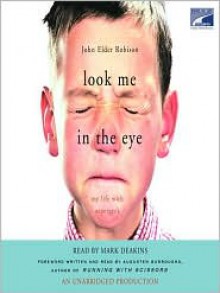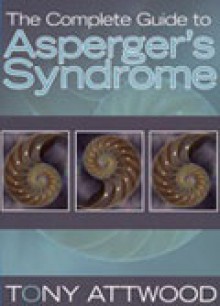
Ever since he was young, John Robison longed to connect with other people, but by the time he was a teenager, his odd habits—an inclination to blurt out non sequiturs, avoid eye contact, dismantle radios, and dig five-foot holes (and stick his younger brother, Augusten Burroughs, in them)—had earned him the label “social deviant.” It was not until he was forty that he was diagnosed with a form of autism called Asperger’s syndrome. That understanding transformed the way he saw himself—and the world. A born storyteller, Robison has written a moving, darkly funny memoir about a life that has taken him from developing exploding guitars for KISS to building a family of his own. It’s a strange, sly, indelible account—sometimes alien yet always deeply human.
Amazon.com
** I already posted this review last year, but when I was organizing my BookLikes blog shelves, I somehow accidentally deleted this review, so am now reposting.
The subtitle here pretty much sums it up. This is Robison talking about his life and how being diagnosed with Asperger's worked into that. Robison explains that he was not officially diagnosed with Asperger's Syndrome until the age of 40, but looking back he now sees he had classic markers of it from early childhood. The problem was, he grew up in a time before much was known of the condition. It wasn't until 1981 that doctors collectively brought together all the flag traits of the syndrome they knew and actually gave it the name Asperger's (named after Dr. Hans Asperger of Austria). I was also amazed to learn just how prevalent this condition is now -- Robison points out that in a 2007 study done by the CDC, 1 in 150 people (or 1 in 50 families) fall somewhere within the autism spectrum!
Though I am familiar with Burrough's family story (since the majority of his books discuss it), it was interesting but saddening to hear Robison's side and how he was affected by his father's alcoholism, his mother's gradual decline into severe mental illness, the lack of affection from both parents -- in fact, his father was pretty abusive. To me it seems like the parents were unconvinced they even wanted kids. Robison finds quiet and calm for his mind when he discovers a love and aptitude for electronics, becoming a self-taught sound engineer. This eventually leads him to developing special effects guitars for the band KISS. He makes good money whenever they go on tour but pretty much nothing when the tours go off, so he talks about scrambling to find work to pay the bills in the meantime. He ends up installing sound and lighting systems for nightclubs, which later opens the door to an engineering job with Milton Bradley, designing sound chips for their electronic games, working his way up into a management position with them. This is all by the age of 23! After doing this for a time, he ends up leaving MB to start up his own company servicing and repairing luxury European cars.
I found myself really moved when he talks about the day his son was born, maybe because of how he described his own childhood. I love seeing guys who embrace being a friend and kind-hearted role model to their kids, rather than just the stern, emotionally constipated disciplinarian. It was cute to read the story about how when his son was born, Robison made sure to "tag" his son with sharpie to make sure the nurses didn't mix his kid up with someone else's! X-D And how he still checked info on the foot bracelet. I especially liked when he joked that when they were leaving the hospital, he noted that after paying nearly $5,000 they weren't given any gifts or perks (clothes, toys, accessories, etc), just pretty much a room and they got to keep the baby, but he was "relatively certain" that the kid living in his house was the same one that came out of his wife seventeen years earlier.
Robison reiterates what a number of memoirs of those with Asperger's say when he talks about his experiences stemming from his inability to pick up on body language or conversational elements such as social cues, facial expressions or sarcasm.He also talks about his struggle with remembering or wanting to use a person's real name so when he develops a close enough relationship with someone, he gives them a nickname instead {ie. his first wife he called Little Cub, so their son he called "Cubbie"; his second wife was Unit 2 (being the second oldest of three sisters) while his in-laws were Unit Zero; Augusten used to be called Snort or Varmit}. While I've read about this trait in other books such as Daniel Tammet's Born On A Blue Day, it was still good to be reminded to be aware of this when conversing with someone with autism or Asperger's.
I think comparatively I took more away from Born On A Blue Day as far as actually learning about the inner workings of an autistic mind a little bit better, but I really liked the humor and conversational tone Robison brought to his story, which was something that felt missing from Tammet's book. For anyone interested in the topic, I recommend reading both. Also, if you are a Burroughs fan like I am, reading Robison's books gives an interesting extra perspective / extra backstory to the works of Burroughs.


 Log in with Facebook
Log in with Facebook 








